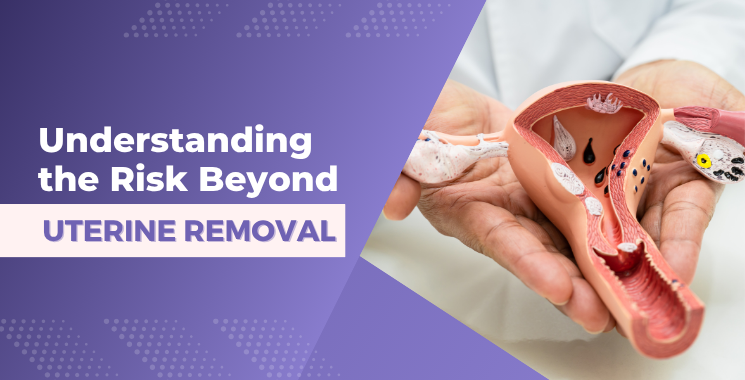“Okay, the uterus is out. I’m safe from gynecologic cancers now.”Totally understandable. But here’s the twist: vaginal cancer after hysterectomy is still a possibility. It’s rare—yes. But not impossible. And when something’s rare, it often slips under the radar… until it’s too late. So let’s break this down together—because being informed means being empowered.
Can You Still Get Vaginal Cancer Without a Uterus?
Just because the uterus is gone doesn’t mean the rest of your reproductive system has left the chat. The vagina is still there—and that’s where vaginal cancer can show up.
Here’s the thing: vaginal cancer only accounts for 1% to 2% of all gynecologic cancers. So, it’s not something most people (or doctors) think of first. But if your hysterectomy was due to cancer, abnormal cervical cells, or persistent HPV, your risk might be a little higher.
Think of it like fixing one part of a house. Just because you replaced the roof doesn’t mean the basement can’t flood later.
Also, let’s not forget other risk boosters—things like smoking, chronic infections, or a weakened immune system. They quietly tip the scales when you’re not looking.
That’s why skipping post-hysterectomy pelvic exams can be risky. Those appointments? They’re not just formalities. They’re your early warning system.
Still with me? Great—because what’s next could make all the difference.
Can You Still Get Vaginal Cancer Without a Uterus?
The symptoms of vaginal cancer? They’re often mistaken for everyday stuff. A little discharge here, some spotting there—it’s easy to wave them off. But persistent symptoms are your body’s way of waving a red flag.
Here’s what to look out for:
- Unusual vaginal bleeding (especially after sex or post-menopause)
- Watery discharge that doesn’t feel right
- Lump or bump inside the vagina
- Painful intercourse—not your typical discomfort
- Ongoing pelvic pain or pressure that lingers
Here’s a little reality check: you know your body better than anyone. If something doesn’t feel right—trust that instinct.
Think of it like driving your car. If it suddenly starts making a weird noise, do you just turn the radio up louder and ignore it? Of course not. You get it checked.
Same goes for your health.
Don’t wait for the “perfect time” to call your doctor. Sooner is always better.
Noticing unusual symptoms after a hysterectomy? Early medical evaluation can make all the difference.
Life After Diagnosis - What to Expect
It’s completely normal to feel overwhelmed. But this diagnosis? It doesn’t define your future. It just means the next chapter is about taking action.
So, what does treatment usually look like?
- Surgery is often step one, especially if the cancer’s caught early. Doctors aim to remove the cancerous tissue while preserving as much healthy function as possible.
- Radiation therapy might follow—either as a standalone or alongside other treatments—to zap any lingering cancer cells.
- Chemotherapy comes into play when cancer has spread or is more aggressive.
And healing isn’t just physical. It’s emotional. Mental. Sexual.
Recovery may include pelvic rehab (yes, it’s a thing), support groups, or therapy to help you adjust and reclaim your sense of self.
Let’s not sugarcoat it: the journey isn’t easy. But it’s one many women walk through—and come out stronger on the other side.
Those regular follow-ups? They’re your health’s pit stops. Think of them as checkpoints that keep you moving forward safely.
Because here’s the truth—this diagnosis isn’t a full stop. It’s a comma.
If you or a loved one is navigating a vaginal cancer diagnosis, know that multidisciplinary care offers hope and healing.
Frequently Asked Questions
Can you still get vaginal cancer if your uterus is removed?
Yes. The vagina remains intact post-hysterectomy, and though rare, cancer can develop there.
Is vaginal cancer linked to HPV?
Absolutely. High-risk strains of HPV are one of the major causes. That’s why HPV vaccination and routine screening matter—big time.
Should you get Pap smears after a hysterectomy?
That depends. If your hysterectomy was done due to cancer or precancerous cells, continued Pap smears might be recommended. Your doctor can guide you.
Is routine screening needed after a hysterectomy?
Yes—especially if there were previous concerns like HPV or cervical dysplasia. Regular pelvic exams are key.
What kind of follow-up is needed post-hysterectomy?
Follow-up care could include pelvic exams, HPV testing, and imaging—tailored to your personal health history and risks.
There you have it. A complete, clear-eyed look at Vaginal Cancer After Hysterectomy, including the early symptoms of vaginal cancer and how to manage post-hysterectomy complications.
Don’t let silence be the reason something goes undetected. Ask the questions. Trust your instincts. Stay involved in your care.
References:
- Mayo Clinic – Vaginal Cancer Overview: https://www.mayoclinic.org/diseases-conditions/vaginal-cancer/symptoms-causes/syc-20356101
- American Cancer Society – Vaginal Cancer: https://www.cancer.org/cancer/vaginal-cancer.html

